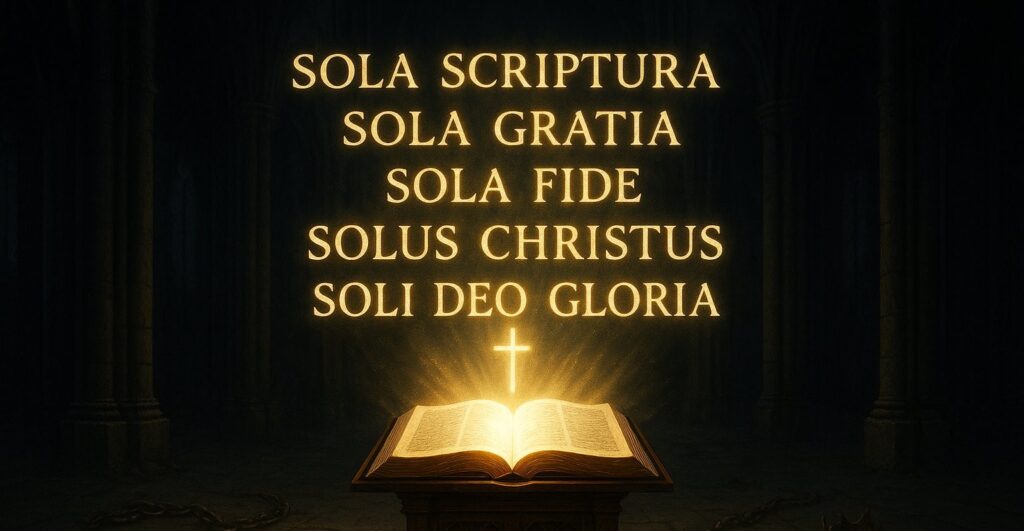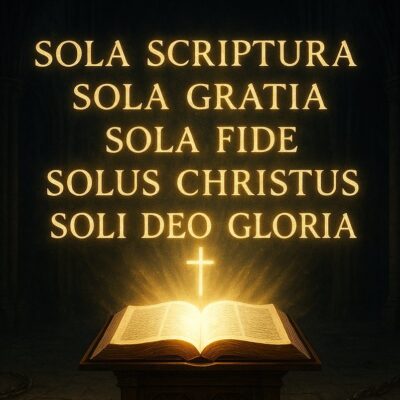
The “five Solas” (“solus” is the Latin word for “alone” or “only”) present a helpful way of summarizing the great themes of Reformation teaching about salvation—through faith alone, by grace alone, in Christ alone, on the authority Scripture alone, to the Glory of God alone. Trinity Presbyterian Church of Norman is a truly reformed church, and this is is evident in our worship. *all Q&A below are from the Westminster Shorter Catechism.
Sola Scriptura
At Trinity Presbyterian Church of Norman, we disciple every member to confront every issue by growing in asking the question, “What does the Bible have to say about that?”
Q. 2. What rule hath God given to direct us how we may glorify and enjoy him?
A. The Word of God, which is contained in the Scriptures of the Old and New Testaments, is the only rule to direct us how we may glorify and enjoy him.
2 Tim. 3:16; Eph. 2:20; 1 John 1:3-4.
Q. 3. What do the Scriptures principally teach?
A. The Scriptures principally teach, what man is to believe concerning God, and what duty God requires of man.
Christ governs Trinity Presbyterian Church of Norman by His Word, not by the opinions, fads, and will of our culture. Our leaders swear fidelity to the Westminster Standards as the best, faithful summary of what the Bible teaches, and in our membership vows, all of our members confess that the scriptures of the Old and New Testament are the Word of God. Our weekly liturgy includes bookends of a call to worship and benediction from scripture and lectio continua scripture readings as well as a reading of God’s word and a consecutive verse by verse expository sermon from books of the Old and New Testament.
Sola Gratia
At Trinity Presbyterian Church of Norman, we teach that God saves His people not because they are good or worthy, but because God is gracious.
Q. 33. What is justification?
A. Justification is an act of God’s free grace, wherein he pardoneth all our sins, and accepteth us as righteous in his sight, only for the righteousness of Christ imputed to us, and received by faith alone.
Rom. 3:24-25; Rom. 4:6-8; 2 Cor. 5:19, 21; Rom. 5:17-19; Gal. 2:16; Phil. 3:9.
Q. 34. What is adoption?
A. Adoption is an act of God’s free grace, whereby we are received into the number, and have a right to all the privileges, of the sons of God.
1 John 3:1; John 1:12; Rom. 8:17.
Q. 35. What is sanctification?
A. Sanctification is the work of God’s free grace, whereby we are renewed in the whole man after the image of God, and are enabled more and more to die unto sin, and live unto righteousness.
2 Thess. 2:13; Eph. 4:23-24; Rom. 6:4, 6; Rom. 8:1.
At Trinity Presbyterian Church of Norman, we believe that as we commit to sola gratia, the Holy Spirit will make us a humble and graciously generous church. We demonstrate this expectation by the ordinary, regular, weekly passing of offering plates to collect His tithes and our offerings. We express God’s grace as Paul said in 2 Corinthians 9, “Each one must give as he has decided in his heart, not reluctantly or under compulsion, for God loves a cheerful giver.” We believe in God’s work in us through all of His ordinary means of grace.
Sola Fide
When it comes to salvation, there is no room for a mixture of faith plus works. This is accurately summarized by the mathematical formulas:
Jesus + Nothing = Everything…. Jesus + something = nothing.
Q. 86. What is faith in Jesus Christ?
A. Faith in Jesus Christ is a saving grace, whereby we receive and rest upon him alone for salvation, as he is offered to us in the gospel.
Heb. 10:39; John 1:12; Isa. 26:3-4; Phil. 3:9; Gal. 2:16.
Q. 87. What is repentance unto life?
A. Repentance unto life is a saving grace, whereby a sinner, out of a true sense of his sin, and apprehension of the mercy of God in Christ, doth, with grief and hatred of his sin, turn from it unto God, with full purpose of, and endeavor after, new obedience.
Acts 11:18; Acts 2:37-38; Joel 2:12; Jer. 3:22; Jer. 31:18-19; Ezek. 36:31; 2 Cor. 7:11; Isa. 1:16-17.
At Trinity Presbyterian Church of Norman, we teach that good works are the fruit of faith, not the root of justification. Salvation is a gift received, not earned. As all men have fallen with our first-father Adam (Romans 5:12-21), even our faith and repentance must be a gift from God, or saving grace. If God were to save men on account of their works, then no one would be saved! Faith looks away from one’s own works to the saving works of Jesus’ perfect life of obedience and his atoning death upon the cross vindicated and approved by God at his resurrection. Each time we gather for worship, we confess our sin corporately and personally, then we are challenged to exercise faith in the gospel promises which are announced. We receive God’s forgiveness by faith, not by works.
Solus Christus
Paul in 1 Corinthians 2:2 says, “For I decided to know nothing among you except Jesus Christ and him crucified.” In Acts 4:12, Peter declared, “And there is salvation in no one else, for there is no other name under heaven given among men by which we must be saved.” John, in John 14:6, records Jesus’ answer to a question from Thomas, ““I am the way, and the truth, and the life. No one comes to the Father except through me.”
Q. 20. Did God leave all mankind to perish in the estate of sin and misery?
A. God having, out of his mere good pleasure, from all eternity, elected some to everlasting life, did enter into a covenant of grace, to deliver them out of the estate of sin and misery, and to bring them into an estate of salvation by a Redeemer.
Eph. 1:4; Rom. 3:20-22; Gal. 3:21-22.
Q. 21. Who is the Redeemer of God’s elect?
A. The only Redeemer of God’s elect is the Lord Jesus Christ, who, being the eternal Son of God, became man, and so was, and continueth to be, God and man in two distinct natures, and one person, for ever.
1 Tim. 2:5-6; John 1:14; Gal. 4:4; Rom. 9:5; Luke 1:35; Col. 2:9; Heb. 7:24-25.
Q. 22. How did Christ, being the Son of God, become man?
A. Christ, the Son of God, became man, by taking to himself a true body and a reasonable soul, being conceived by the power of the Holy Ghost, in the womb of the Virgin Mary, and born of her, yet without sin.
Heb. 2:14, 16; Heb. 10:5; Matt. 26:38; Luke 1:27, 31, 35, 42; Gal. 4:4; Heb. 4:15; Heb. 7:26.
Q. 23. What offices doth Christ execute as our Redeemer?
A. Christ, as our Redeemer, executeth the offices of a prophet, of a priest, and of a king, both in his estate of humiliation and exaltation.
Acts 3:21-22; Heb. 12:25 with 2 Cor. 13:3; Heb. 5:5-7; Heb. 7:25; Ps. 2:6; Isa. 9:6-7; Matt. 21:5; Ps. 2:8-11.
Q. 24. How doth Christ execute the office of a prophet?
A. Christ executeth the office of a prophet, in revealing to us, by his Word and Spirit, the will of God for our salvation.
John 1:18; 1 Pet. 1:10-12; John 15:15; John 20:31.
Q. 25. How doth Christ execute the office of a priest?
A. Christ executeth the office of a priest, in his once offering up of himself a sacrifice to satisfy divine justice and reconcile us to God, and in making continual intercession for us.
Heb. 9:14, 28; Heb. 2:17; Heb. 7:24-25.
Q. 26. How doth Christ execute the office of a king?
A. Christ executeth the office of a king, in subduing us to himself, in ruling and defending us, and in restraining and conquering all his and our enemies.
Acts 15:14-16; Isa. 33:22; Isa. 32:1-2; 1 Cor. 15:25.
Nothing more, nothing less, nothing else, no one but Christ alone can save us! At Trinity Presbyterian Church of Norman, each time we gather for worship we observe the Lord’s Supper because the body and blood of Christ are the sole basis of our participation in God and His Love AND we call all who are present to flee from sin and trust alone in Jesus for salvation and eternal life.
Soli Deo Gloria
Since salvation is God’s work from start to finish, He alone deserves all praise. And all that we do should be to His glory, not our own. 1 Corinthians 10:31 reads, “So, whether you eat or drink, or whatever you do, do all to the glory of God.”
Q. 1. What is the chief end of man?
A. Man’s chief end is to glorify God, and to enjoy him for ever.
1 Cor. 10:31; Rom. 11:36; Ps. 73:25-28.
Q. 101. What do we pray for in the first petition of the Lord’s Prayer?
A. In the first petition, which is, Hallowed be thy name,” we pray, that God would enable us, and others, to glorify him in all that whereby he maketh himself known, and that he would dispose all things to his own glory.
Matt. 6:9; Ps. 67:2-3; Ps. 83.
Trinity Presbyterian Church of Norman always prays the Lord’s Prayer when we gather for worship because we never move beyond the purpose of hallowing His Name.
We will pause from our series in Hebrews on October 26 to reflect upon God’s work in the original reformation and to consider the call to a modern reformation in Oklahoma.


